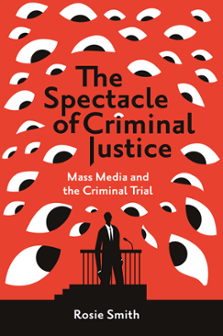
Existing Legislation on the Role of Cameras in Courtrooms
The Spectacle of Criminal Justice: Mass Media and the Criminal Trial
ISBN: 978-1-83982-823-2, eISBN: 978-1-83982-822-5
Publication date: 29 March 2022
Citation
Smith, R. (2022), "Existing Legislation on the Role of Cameras in Courtrooms", The Spectacle of Criminal Justice: Mass Media and the Criminal Trial, Emerald Publishing Limited, Leeds, pp. 127-128. https://doi.org/10.1108/978-1-83982-822-520221018
Publisher
:Emerald Publishing Limited
Copyright © 2022 Rosie Smith
England and Wales
Filming in the UK Supreme Court has been legal since 2009, and since 2013, filming in the Court of Appeals was allowed in England and Wales. However, in both instances, filming is confined to lawyers’ arguments and judges’ rulings and, to date, is carried out by the court itself rather than external broadcasting companies. In 2020, The Crown Court (Recording and Broadcasting) Order No. 637 came into force which allowed (in line with strict conditions) television cameras in Crown Courts. As with existing legislation, however, only High Court and Senior Circuit judges are allowed to be filmed while passing sentences in serious high-profile cases such as murder, terrorism, or sex offences, including trials which take place in the Old Bailey. Under these rules, filming can be live and distributed with a short time delay. Importantly, broadcasters can only record with the prior written permission of the judge (Article 7) and must not be for the purposes of light entertainment or satire (Article 10). Under these conditions,
section 41 of the Criminal Justice Act 1925 (c.86) (which makes it an offence to film in court) and section 9 of the Contempt of Court Act 1981 (c.49) (which provides it is a contempt of court to record sound in court except with the permission of the court) do not apply. (The Crown Court (Recording and Broadcasting) Order 2020)
United States of America
Since the 2016 US Judicial Conference, the current laws are that
A judge may authorise broadcasting, televising, recording or taking photographs in the courtroom in adjacent areas during investitive, naturalisation, or other ceremonial proceedings. A judge may authorise such activities in the courtroom or adjacent areas during other proceedings, or recesses between such other proceedings only: 1) for the presentation of evidence; 2) for the perpetuation of the record of the proceedings; 3) for security purposes; 4) for other purposes of judicial admin; 5) for the photographing, recording, or broadcasting of appellate arguments; or 6) in accordance with pilot programs approved by the Judicial Conference. When broadcasting, televising, recording, or photographing in the courtroom or adjacent areas is permitted, a judge should ensure that it is done in a manner that will 1) be consistent with the rights of the parties; 2) not unduly distract participants in the proceeding and; 3) not otherwise interfere with the admin of justice. (United States Courts, n.d.)
Norway
Within the Supreme Court of Norway,
With regard to cases that attract extensive media attention, the procedure for photography and filming is agreed in advance. In line with the Supreme Court’s desire for openness, the Court will continue the practice of permitting TV broadcasts of legal cases except where extraordinary reasons prevent it … TV filming and interviews can be carried out in the court halls and in the public areas by arrangement with the information advisor and within the framework imposed by the Norwegian Administration of Courts Act. With the permission of the court, filming can be carried out in the court halls in connection with legal negotiations. (Supreme Court of Norway, n.d.)
According to the Courts of Justice Act (translation) of 13 August 1915 No. 5, Section 131a,
‘Photographing, filming and recording for radio or television are prohibited during criminal proceedings. Photography or filming the defendant or the convicted party en route to or from the hearing, or in the building in which the hearing is being held, is also forbidden without the party’s consent. Where special grounds allow, the court may, during the main proceedings, make an exception to the ban, where it cannot be deemed to have a detrimental effect on the conducting o proceedings and where no other factors are present which may be deemed potentially detrimental. The parties shall have the opportunity to comment before permission is granted. The King may provide more detailed regulations pertaining to satisfying and implementing permissions. The King may issue regulations for the rules of procedure pertaining to satisfying the regulations in the Provision of Services Act in relation to an application for permission to photograph, film, and make recordings for radio or television, including procedural deadlines and the legal consequences of deadline violation. Exception from the Provision of Services Act section 11, second paragraph, may only be made where this is justified by compelling public interesting, including consideration of a private party’s protection-worthy interests. (Court of Justice Act, 1915)
- Prelims
- Introduction: Spectacular Justice
- Chapter 1: The Evolution of the Spectacle
- Chapter 2: Celebrity and Spectacles of Criminal Justice
- Chapter 3: Childhood, Transgression, and Spectacles of Criminal Justice
- Chapter 4: Gender, Drama, and Spectacles of Criminal Justice
- Chapter 5: Terrorism, Politics, and Spectacles of Criminal Justice
- Conclusion
- Appendix: Existing Legislation on the Role of Cameras in Courtrooms
- Bibliography
- Index